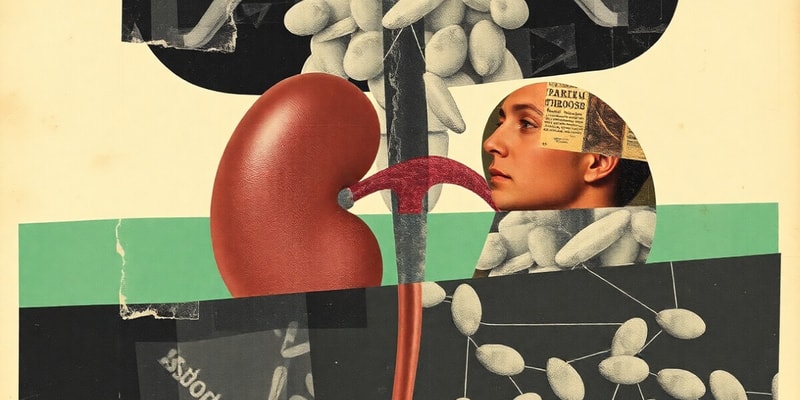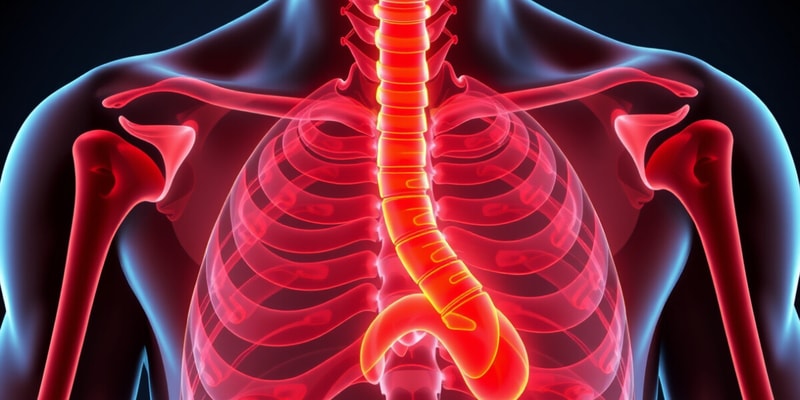Questions and Answers
What is a potential complication of severe hyponatremia?
Which symptom is commonly associated with hypothyroidism?
Which treatment is indicated for severe hyponatremia?
Which of the following conditions is a cause of hypothyroidism?
Signup and view all the answers
What is a late symptom of water volume excess?
Signup and view all the answers
What is the primary treatment goal for hypoparathyroidism?
Signup and view all the answers
What significant symptoms would indicate hyperparathyroidism?
Signup and view all the answers
What is a common complication of acromegaly if left untreated?
Signup and view all the answers
Which method is recommended to prevent the formation of renal calculi in hyperparathyroidism?
Signup and view all the answers
What are the common causes of hypoparathyroidism?
Signup and view all the answers
Which symptom is specifically associated with hypocalcemia in hypoparathyroidism?
Signup and view all the answers
What characterizes the physical changes in a patient with acromegaly?
Signup and view all the answers
What is a non-invasive treatment option for hyperparathyroidism?
Signup and view all the answers
What is the primary treatment method for removing a pituitary adenoma?
Signup and view all the answers
Which of the following symptoms is NOT associated with diabetes insipidus?
Signup and view all the answers
What causes the central form of diabetes insipidus?
Signup and view all the answers
Which medication is used to inhibit the release of growth hormones in patients with acromegaly?
Signup and view all the answers
In diabetes insipidus, what would you expect to find in a urine analysis?
Signup and view all the answers
What is a possible complication of untreated diabetes insipidus?
Signup and view all the answers
Which assessment finding is indicative of polyuria in a patient?
Signup and view all the answers
What is one common medication that can cause nephrogenic diabetes insipidus?
Signup and view all the answers
What is a primary characteristic of Hyperglycemia Hyperosmolar Syndrome (HHS)?
Signup and view all the answers
What causes Hyperglycemia Hyperosmolar Syndrome to develop slowly?
Signup and view all the answers
What long-term complication of diabetes can cause visual impairments and is a leading cause of blindness?
Signup and view all the answers
Which condition is associated with the thickening of vessel walls, leading to a higher risk of heart attack in diabetes?
Signup and view all the answers
What symptom is the result of cerebral dehydration due to extreme hyperosmolarity in HHS?
Signup and view all the answers
What is the recommended approach for diabetic foot care?
Signup and view all the answers
Which condition leads to a significant leak of proteins into the urine in diabetes?
Signup and view all the answers
What can occur due to unrecognized foot injuries in diabetic patients?
Signup and view all the answers
What complication of diabetes most affects the distal portions of nerves?
Signup and view all the answers
Which of the following assessments is most indicative of Cushing's Syndrome?
Signup and view all the answers
What is the primary goal when treating hyperglycemia in HHS?
Signup and view all the answers
What is a common consequence of uncontrolled Type 2 diabetes mellitus?
Signup and view all the answers
Which treatment option is most appropriate for a Cushing's Syndrome caused by a pituitary tumor?
Signup and view all the answers
What does the presence of striae indicate in a patient with Cushing’s Syndrome?
Signup and view all the answers
Which of the following is a risk factor for developing Type 2 diabetes?
Signup and view all the answers
What condition is characterized by a fasting plasma glucose level of 110 mg/dL?
Signup and view all the answers
What is the primary factor leading to hyperglycemia in Type 1 Diabetes Mellitus?
Signup and view all the answers
Which of the following symptoms is NOT typically associated with diabetes?
Signup and view all the answers
In managing gestational diabetes, which strategy is emphasized first?
Signup and view all the answers
Which of the following is a consequence of diabetes associated with kidney disease?
Signup and view all the answers
What effect does insulin have on glucose metabolism?
Signup and view all the answers
Which hormonal change in Cushing’s Syndrome can lead to heart failure?
Signup and view all the answers
Which type of diabetes is typically characterized by insulin resistance?
Signup and view all the answers
What is a possible treatment for hyperkalemia in patients with diabetes?
Signup and view all the answers
Study Notes
Hyperparathyroidism
- Results from excessive parathyroid hormone production.
- Causes bone decalcification and formation of calcium-containing kidney stones.
- Symptoms include pain, fatigue, muscle weakness, nausea, vomiting, constipation, hypertension, cardiac arrhythmias, and anorexia.
- Treatment involves the surgical removal of one or more parathyroid glands, usually performed minimally invasively on an outpatient basis.
- Increased daily fluid intake (more than 2 liters) is crucial to prevent kidney stone formation.
- Weight-bearing activities like walking are recommended to reduce calcium release from bones.
- Bedrest can exacerbate calcium excretion, increasing kidney stone risk.
- Encourage a normal calcium diet and manage constipation with prune juice, activity, and stool softeners.
Hypoparathyroidism
- Often caused by removal or damage to parathyroid glands during thyroid surgery.
- Other causes include autoimmune disorders and vitamin D deficiency.
- Leads to hyperphosphatemia (high blood phosphate) and hypocalcemia (low calcium), with hypocalcemia being the primary symptom.
- Symptoms include muscle tremors, spasms, numbness, tingling, and positive Trousseau's and Chvostek's signs.
- Treatment aims to raise serum calcium levels to 9-10 mg/dL, with options including calcium, magnesium, herbal calciferol, and calcitriol.
Pituitary Disorders
Acromegaly
- A rare condition characterized by excess growth hormone (GH) in adults without height increase.
- Diagnosed using labs, X-rays, and CT scans.
- Physical signs include enlarged facial features, hands, and feet, and deepening voice.
- Symptoms involve headaches, sweating, hypertension, and increased risk of diabetes and heart issues if untreated.
- Treatment options include surgery, medications to inhibit GH release, and radiation therapy.
- Notable medications include octreotide, lanreotide, and pegvisomant.
Diabetes Insipidus
- Caused by insufficient antidiuretic hormone (ADH) leading to excessive urine output.
- Results from central causes (brain injury, surgery) or nephrogenic causes (kidney's insensitive to ADH).
- Symptoms include dehydration, dry skin, confusion, and polyuria (3-20 L/day) alongside polydipsia.
- Laboratory findings show low urine specific gravity and high serum osmolality.
- Care involves monitoring vital signs, daily weights, and fluid/electrolyte management.
Syndrome of Inappropriate Antidiuretic Hormone (SIADH)
- Characterized by excessive ADH leading to fluid retention.
- Causes include tumors, head injury, and certain medications.
- Early symptoms involve headache, weakness, and signs of fluid overload.
- Late symptoms can include confusion, lethargy, nausea, and seizures.
- Care includes fluid restriction, monitoring urine/blood chemistries, and potentially administering diuretics or hypertonic saline.
Thyroid Disorders
Hypothyroidism
- Defined by decreased levels of thyroid hormone, leading to slowed metabolism.
- Common causes include autoimmune thyroiditis (Hashimoto's disease) and treatment for hyperthyroidism.
- Symptoms include fatigue, cold intolerance, weight gain, and bradycardia.
- Severe cases may lead to myxedema, requiring urgent interventions.
Cushing’s Syndrome/Disease
- Results from increased adrenal cortex hormones, often due to medications or tumors.
- Classic symptoms include central obesity, moon face, and hypertension.
- Treatment options focus on addressing the cause, including medication adjustments or surgery.
- Effects of increased androgen can lead to hirsutism and menstrual disturbances.
Diabetes Mellitus (DM)
- A chronic disorder characterized by hyperglycemia due to inadequate insulin production or response.
- Types include Type 1 (insulin-dependent), Type 2 (insulin resistance), and gestational diabetes.
- Symptoms manifest as polyuria, polydipsia, and polyphagia.
- Normal fasting plasma glucose levels are 70-99 mg/dL, with prediabetes at 100-125 mg/dL, and diabetes at ≥126 mg/dL.
- Long-term complications include neuropathy, nephropathy, retinopathy, and increased cardiovascular risks.
Diabetes Treatment and Management
- Focus on education, medication adherence, dietary changes, and physical activity.
- Hyperglycemic Hyperosmolar Syndrome (HHS) is a serious risk in Type 2 diabetes, characterized by extreme hyperglycemia and dehydration.
- Care for long-term complications involves regular monitoring of blood glucose and lifestyle modifications to prevent progression.
Foot Care for Diabetic Patients
- Daily foot inspection and washing in warm water are essential.
- Use lotion on the tops and bottoms of feet, avoiding the spaces between toes.
- Shoes and socks should be worn at all times, and toenails should be trimmed straight across.
- Protect feet from extreme temperatures and avoid crossing legs to maintain circulation.
Studying That Suits You
Use AI to generate personalized quizzes and flashcards to suit your learning preferences.
Description
This quiz explores hyperparathyroidism, a condition characterized by the overproduction of parathyroid hormones leading to bone decalcification and kidney stones. It covers symptoms, treatment options, and management strategies, including fluid intake recommendations. Test your understanding of this hormonal disorder and its implications.




